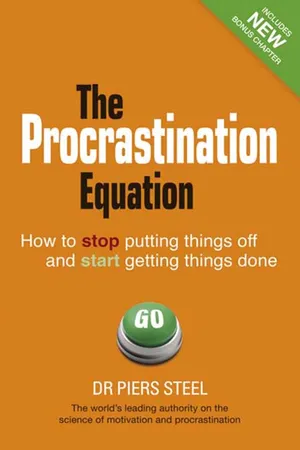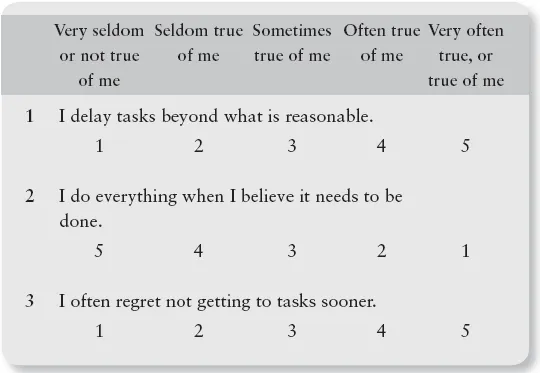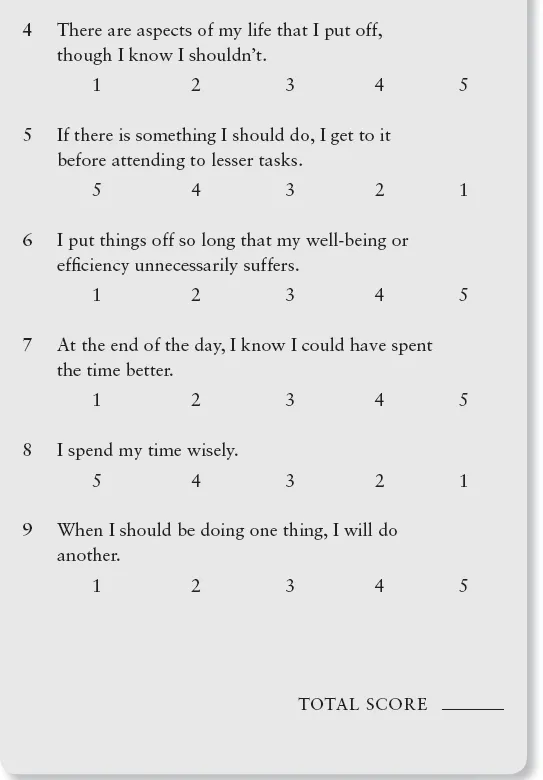
eBook - ePub
No longer available
The Procrastination Equation
Piers Steel
This book isn’t in the library right now, search for another
- 368 pages
- English
- ePUB (mobile friendly)
- Available on iOS & Android
eBook - ePub
No longer available
The Procrastination Equation
Piers Steel
Book details
Book preview
Table of contents
Citations
About This Book
In this groundbreaking book, the world's leading expert on procrastination, Dr Piers Steel, reveals the truth about why procrastinate – and shows us what we can do about it.
Using a powerful mix of psychology, science, self-help, and a decade of his own research, Dr Steel shows us what effect procrastination has on our lives, and offers real hope to sufferers everywhere.
New to this revised edition, Dr Steel shows exactly how to apply the techniques in common problem areas, resulting in a step-by-step procrastination busting guide for work, money matters and losing weight.
Frequently asked questions
How do I cancel my subscription?
Can/how do I download books?
At the moment all of our mobile-responsive ePub books are available to download via the app. Most of our PDFs are also available to download and we're working on making the final remaining ones downloadable now. Learn more here.
What is the difference between the pricing plans?
Both plans give you full access to the library and all of Perlego’s features. The only differences are the price and subscription period: With the annual plan you’ll save around 30% compared to 12 months on the monthly plan.
What is Perlego?
We are an online textbook subscription service, where you can get access to an entire online library for less than the price of a single book per month. With over 1 million books across 1000+ topics, we’ve got you covered! Learn more here.
Do you support text-to-speech?
Look out for the read-aloud symbol on your next book to see if you can listen to it. The read-aloud tool reads text aloud for you, highlighting the text as it is being read. You can pause it, speed it up and slow it down. Learn more here.
Is The Procrastination Equation an online PDF/ePUB?
Yes, you can access The Procrastination Equation by Piers Steel in PDF and/or ePUB format, as well as other popular books in Personal Development & Self Improvement. We have over one million books available in our catalogue for you to explore.
Information
CHAPTER 1
Portrait of a procrastinator
Never put off till tomorrow, what you can do the day after tomorrow. MARK TWAIN
THIS BOOK IS ABOUT EVERY promise you made to yourself but broke. It is about every goal you set but let slide, never finding the motivation. It is about diets postponed, late-night scrambles to finish projects, and disappointed looks from the people who depend on you – or from the one you see in the mirror. It is about being the slacker in your family and the straggler in your circle of friends. It is about that menacing cloud of uncompleted chores, from the late bill payments to the clutter that fills your home. It is about that doctor’s appointment you have been putting off and the finances still in disarray. It is about dawdling, delay, opportunity lost, and more. Much more. This book is also about the other side, the moments of action when procrastination gives way to crystal clarity and attention, work is devoured without hesitation, and giving up never even occurs to you. It is about personal transformation, about unencumbered desire free of internal competition, and the guiltless leisure you can enjoy when your daily tasks are done. This book is about potential, wasted and fulfilled; about dreams that fade into obscurity and dreams we can make come true. Best of all, this book is about shifting the rest of your life away from putting it off to getting it done.
The pivot point that tips us away from accomplishing what we want and need to do is procrastination. It isn’t a question of laziness, although the two are easily confused. Unlike the truly slothful, procrastinators want to do what they need to do – and usually do get around to it, but not without a lot of struggle. I will show that this dillydallying is in part hereditary, and that we are hardwired to delay. Our tendency to put things off took a hundred million years to form and is now almost etched into our being. But research shows that, despite its ingrained nature, we can modify our habits and change this behaviour. Procrastinators who understand the processes behind their inaction can master them and become less stressed about their deadlines and more able to meet them.
This book tells procrastination’s story. It stretches from Memphis of ancient Egypt to modern New York City, from the cancer ward to the stock market floor. I hope to enlighten you about why we procrastinate, what comes of procrastination, and what strategies we can employ to do something about it. We will start off simply, establishing what procrastination is, helping you decide whether you are a procrastinator, and if so, how you are likely to experience a bout of procrastination. If you are a procrastinator – and the odds are good that you are – you are part of a very large community indeed. It is time we all got to know each other a little bit better.
WHAT PROCRASTINATION IS AND ISN’T
There is so much confusion about procrastination that it’s best to lay our subject bare on the dissecting table and start immediately separating the dilly from the dally. By procrastinating you are not just delaying, though delay is an integral part of what you are doing. Procrastination comes from the Latin pro, which means ‘forward, forth, or in favour of’, and crastinus, which means ‘of tomorrow’. But procrastination means so much more than its literal meaning. Prudence, patience and prioritising all have elements of delay, yet none means the same as procrastination. Since its first appearance in the English language in the sixteenth century, procrastination has identified not just any delay but an irrational one – that is, when we voluntarily put off tasks despite believing ourselves to be worse off for doing so. When we procrastinate, we know we are acting against our own best interests.
Still, you will find people mischaracterising wise delays as procrastination. Seeing a co-worker stretched out in his office chair, arms crossed behind his head, relaxed, you ask what he is up to and get a cheerful response of ‘Me? I’m procrastinating!’ But he isn’t. He is happily putting off a report because he knows there is a good chance that the project is going to be cancelled later this week, and if it isn’t, well, he can still definitely write it at the last minute anyway. This is smart. In this scenario, it is the person who compulsively has to finish everything as soon as possible who is irrational, tackling work even when it is destined to become irrelevant. The obsessive who completes every task at the first opportunity can be just as dysfunctional as the procrastinator who leaves everything to the last moment. Neither one is scheduling time intelligently.
Consequently, it isn’t procrastination if you fail to arrive at a party far earlier than everyone else or if you don’t get to the airport for your flight three hours in advance. By delaying a little bit, you save awkward moments with your host, who is likely still getting things ready, and you will be spared uncomfortable hours at your gate waiting for your plane to take off. Neither is it procrastination to respond to emergencies by dropping (and putting off) everything else. Insisting that you should finish mowing the front lawn before attending to your house, which has just caught fire, isn’t smart. Sure, you didn’t put off trimming the grass but the charred ruin of your home is too high a price to pay. Alternatively, flexibly adapting your schedule to respond to the pressing needs of a spouse or a child will likely save you from ruining your family life. Not everything can happen at once; it is in your choice of what to do now and what to delay that procrastination happens, not in delay itself.
YOU THE PROCRASTINATOR
Now that we understand what procrastination is, do you practise it? Where do you land in the ranks of procrastination? Are you a garden-variety dillydallier or are you hardcore with ‘tomorrow’ tattooed across your back? There are some entertaining methods that may reveal your propensity to procrastinate. To begin, check your handwriting. If it is sluggish and disjointed, it may indicate you are likewise. Alternatively, look to the stars . . . well, really the planets. Astrologers note that when Mercury is in retrograde or in opposition to Jupiter, procrastination tends to be on the uptick.1 Or try a tarot card reading. The ‘Two of Swords’ often indicates you are split with a dilemma and procrastinating on your decision. Personally, I prefer a more scientific approach. You can go to my website, www.procrastinationequation.com, for a comprehensive test that I’ve administered to tens of thousands of subjects, and compare your level of irrational delay with those of individuals around the world. However, if time is pressing and you wish not to delay, you might try the shorter quiz provided below. Complete the mini-version here, noting that questions 2, 5 and 8 are scored in the opposite direction from the other items:


| SCORE | COMPARED TO EVERYONE ELSE |
|---|---|
| 19 or less | You are in the bottom 10% Your mantra is ‘first-things-first’ |
| 20–23 | You are in the bottom 10–25% |
| 24–31 | You are in the middle 50% Average procrastinator |
| 32–36 | You are in the top 10–25% |
| 37 or more | You are in the top 10% ‘Tomorrow’ is your middle name |
Where did you end up? Are you legendary for leaving things to the last minute or do you only put off exercising and paying bills, like almost everyone else?
PROCRASTINATION POLKA
The higher you scored on that procrastination test, the greater the chance that you are procrastinating right now. Certain other tasks should be occupying your attention – which sadly means you have better things to do than reading this book. These tasks are likely unpleasant, possibly administrative and boring, and perhaps difficult to visualise as being successfully accomplished. Let me make a few guesses about what is on your plate:
- Is your laundry basket overflowing?
- Are there dirty dishes in the sink?
- Do your smoke detectors need new batteries?
- How about your car battery? What is the air pressure in your tyres and how long has it been since the last oil change?
- Isn’t there a ticket to book, a room to reserve, a bag to pack, a passport to renew?
- Have you informed your boss about your holiday plans?
- Have you bought a gift for that forthcoming birthday?
- Have you filled out your time sheets, performance reviews and expense reports?
- Did you hold that difficult conversation you know you need to have?
- Have you scheduled the meeting you are dreading?
- What about the big project your boss gave you? Are you making progress?
- Did you make it to the gym this week?
- Have you called your mum?
How does that list strike you? You can add to it, of course. Even if I didn’t score a direct hit, you were likely procrastinating somewhere else, pushing a task into the future. On its own, each of these postponed tasks has few repercussions. Together, they can culminate in misery by nibbling away at your life. The major project, the one with the hard deadline, is the mother of all such concerns; it can keep you awake at night and make it difficult to accomplish any of the other tasks on your list. At one time or another, we have all felt motivationally marooned and unable to get around to the report, the research, the writing, the presentation to prep, or the exam to ace.
There is a common pattern to all procrastination and it goes something like this. At the start of a big project, time is abundant. You wallow in its elastic embrace. You make a few passes at getting down to it, but nothing makes you feel wholeheartedly engaged. If the job can be forgotten, you’ll forget it. Then the day arrives when you really intend to get down to work, but suddenly it’s just something you don’t feel like doing. You can’t get traction. Every time you try to wrap your mind around it, something distracts you, defeating your attempts at progress. So you forward your task to a date with more hours, only to find that every tomorrow seems to have the same twenty-four. At the end of each of these days, you face the disquieting mystery of where it went. This goes on for a while.
Eventually, time’s limited nature reveals itself. Hours, once tossed carelessly away, become increasingly limited and precious. That very pressure makes it hard to get started. You want to get going on the big project but instead you take on peripheral chores. You clean your office or clean up your e-mail; you exercise; you shop and cook. The tasks that enable your procrastination may not even be enjoyable, but justifiable and not as painful as whatever it is you should be tackling. Part of you does know that this isn’t what you should be doing, and so you say to yourself, ‘I am doing this; at least I am preparing by doing something’. Eventually, it is too late in the day to really get started, so you may as well go to bed. And the cycle of avoidance starts again with the dawn.
Sometimes, to quell your anxiety, you give in to total diversion. You take a moment to check your e-mail or the sports scores. From there, why not respond to a few messages or watch a few minutes of TV? Soon these temptations have seduced you. The task still waggles itself in the periphery of your vision, but you don’t want to look it in the eye – it will have you if you look – so you burrow deeper into your distractions. You organise every minutia of your workspace, write long passionate comments on online forums, troll for news tidbits, or manically switch TV channels at the first ebb of interest. Pleasure turns to powerlessness as you become unable to extract yourself.
As the deadline approaches, you make the diversions more intense so that they will sufficiently distract you. Banishing anything that reminds you of the dreaded thing, you shun calendars and timepieces. In a wilful distortion of reality, you shift your plans from what you once could solidly accomplish to what is minimally possible. When you should be working harder than ever, you are sleeping in, daydreaming of alternative worlds, of winning the lottery, of bei...
Table of contents
Citation styles for The Procrastination Equation
APA 6 Citation
Steel, P. (2012). The Procrastination Equation (2nd ed.). Pearson. Retrieved from https://www.perlego.com/book/398172/the-procrastination-equation-pdf (Original work published 2012)
Chicago Citation
Steel, Piers. (2012) 2012. The Procrastination Equation. 2nd ed. Pearson. https://www.perlego.com/book/398172/the-procrastination-equation-pdf.
Harvard Citation
Steel, P. (2012) The Procrastination Equation. 2nd edn. Pearson. Available at: https://www.perlego.com/book/398172/the-procrastination-equation-pdf (Accessed: 14 October 2022).
MLA 7 Citation
Steel, Piers. The Procrastination Equation. 2nd ed. Pearson, 2012. Web. 14 Oct. 2022.